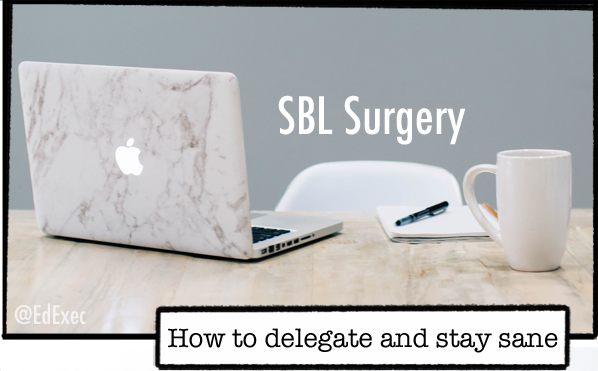I’ve seen a lot of tweets recently from SBLs (and other school leaders) who are having a crisis of confidence; who don’t feel that their ‘best’ is ‘good enough’.
As someone who struggles with these thoughts too, I wanted to write something for those of us that spend our time worrying about… well, everything.
These thoughts come to us as a ‘voice’ in our head. We think things like:
- ‘I should have done this’
- ‘I should be doing that’,
- ‘Why didn’t I do that better?’
- ‘How did I not see that coming?’
- ‘If only I’d have done that instead.’
- ‘So many things aren’t happening/have gone wrong that it must be my fault.’
- ‘If I had more time, if I had been quicker, if I knew what the hell I was doing – then everything would be ok.’
- ‘I don’t know the answer so I must be bad at this job.’
- ‘I knew I couldn’t do this job and now everybody else knows it.’
This ‘voice’ or ‘negative self-talk’ represents our inner critic. There are times when it serves us well by motivating us and challenging us to be better. It shows that we care, that we take pride in what we do and that we are striving to improve.
But other times, especially in times of change and stress, it can limit our beliefs in our ability and potential. It can cause analysis paralysis: ‘Nothing gets done, nothing is ever good enough. Nothing is ever good enough because I’m not good enough. ‘
Most of us are used to living with these thoughts weaving in and out of our consciousness but they have become even louder and more persistent in this new Covid-world that we’re living in. A world that’s scary, full of unknowns and changing at a pace so frantic that some days, we are so overwhelmed that we just want to hide under our duvets until it goes away.
It’s hard, it’s stressful, and it’s awful. It’s unprecedented, it’s scary and it’s relentless. We don’t know what’s coming and we don’t know how to prepare. That crystal ball that people suspect we have? It’s well and truly fried.
I find that when I’m feeling like this, an outside perspective can help me to acknowledge what’s happening, refocus my thoughts and sometimes, just help me to give myself a break.
So today, if you’re feeling not ‘good enough’ or that doing your ‘best’ isn’t going to get you through this, I want to give you that outside perspective.
That voice in your head is talking crap.
What the hell does it know about what is ‘good enough’?
Who is it to define what our ‘best’ is?
And what is ‘good enough’ anyway?
- Is it working on ‘holidays’, evenings, bank holidays and weekends to make sure that students and parents have got the food, school work and support that they need?
- Is it sending so many e-mails and making so many calls that it would be pointless to count, to third parties who aren’t doing what they should be doing or are asking you to do something that’s nonsense?
- Is it leaving your family sleeping in bed whilst you get up at the crack of dawn to try and log onto whatever portal it is to do whatever it is you have to do? And because it doesn’t work, is it again leaving your family sleeping in bed whilst you creep downstairs at 2am to try and get it done?
- Is it spending hours combing through reams and reams of ‘guidance’ that is vague, contradictory and seemingly impossible to implement?
- Is it trying to make a plan without having all of the information you need?
- Is it time spent hunting the internet for hand sanitiser, cleaning products and PPE to make sure that everyone who comes into your school is safe?
- Is it making tough decisions in a context of fear, confusion and conflict?
- Is it sacrificing your own wellbeing to look after the wellbeing of others?
I’ve seen and spoken to many of you over these last few months to know exactly what it is that you’re doing and I want to ask you now, what isn’t ‘good enough’? How is this not your ‘best’? What else could you actually be doing?
No, not everything is going to plan but it rarely does!
No, we can’t keep everyone happy but have we ever been able to?
No, we don’t have all the answers but who does?
Instead, I want you to know this.
I see you.
You are amazing. You are standing strong in the face of uncertainty and adversity and you are GETTING IT DONE. You are doing what you can with what you have and you are making decisions based on the information you have at the time.
You are feeding your students, you are looking after those who need looking after, you are providing a safe haven to those who need it, you are taking care of your staff, you are asking the questions that need to be answered, you are reworking your budgets to resource your front line: you are a fricking hero.
So the next time that voice starts talking, tell it to shut up. Give it the finger. Blow a raspberry at it. Turn your music up.
Say to yourself out loud – ‘I am doing my best and it is enough.’
The rest? Well, we’ll figure it out like we always do.
How? Because we have each other.
Though it might feel like it, you’re not alone in this. None of us are. Keep talking, keep reaching out and keep asking questions.
And when you feel that doubt creeping in, tell it to shut up, turn up your music and give yourself a break.
You deserve it.
(And if you need someone to talk to, I’m here – you can DM me on Twitter or click here to get in touch.)
Like what you’ve read? Subscribe to this blog by clicking here.










